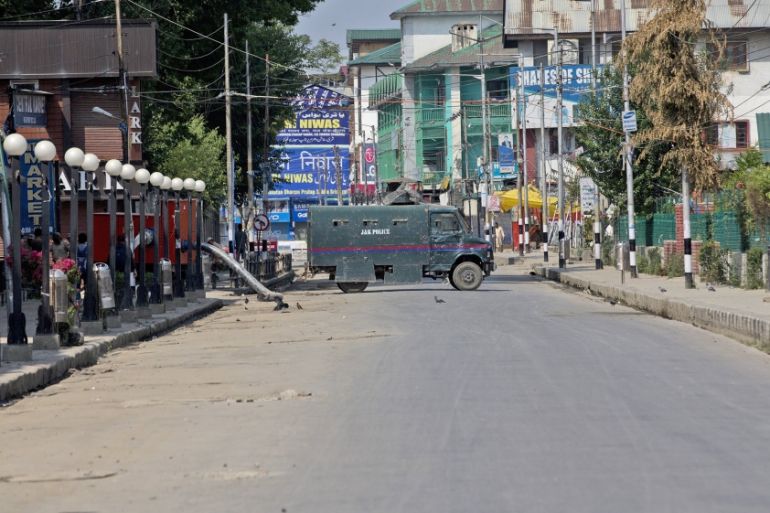Bill to split Kashmir in parliament as region remains on lockdown
India’s BJP government brings bill to carve two ‘union territories’ out of Muslim-majority state, which is under curfew.

India‘s lower house of parliament is set to ratify a bill that would downgrade the governance of India-administered Kashmir even as the Muslim-majority region remains in lockdown for more than 24 hours.
Home Minister Amit Shah introduced the Jammu and Kashmir Reorganisation Bill in the Lok Sabha – India’s lower house of parliament – on Tuesday to bifurcate the state into two “union territories”.
The bill in Lok Sabha came one day after a presidential order dissolved Article 370, a constitutional provision that granted the Himalayan region partial autonomy to frame laws.
The Lok Sabha is expected to easily ratify the bill downgrading Kashmir from a state to a union territory with a legislature and carving out the Ladakh region as another union territory without a legislature.
On Monday, parliament’s upper house approved the bill with a two-thirds majority, with many opposition lawmakers voting with the ruling Hindu-nationalist Bharatiya Janata Party (BJP).
In Lok Sabha, the statutory resolution scrapping Kashmir’s special status as guaranteed through Article 370 of the Indian constitution was passed by a voice vote on Monday evening.
The measures were taken after the government moved tens of thousands of additional forces to Kashmir, already one of the world’s most militarised regions, where an armed rebellion against Indian rule has been ongoing for three decades.
National integration isn’t furthered by unilaterally tearing apart J&K, imprisoning elected representatives and violating our Constitution. This nation is made by its people, not plots of land.
This abuse of executive power has grave implications for our national security.
— Rahul Gandhi (@RahulGandhi) August 6, 2019
Curfew and arrests
Meanwhile, Kashmir remained virtually cut off from the outside world for a second day on Tuesday, with phone and internet links cut and thousands of troops enforcing a curfew.
Mobile and internet services have previously been cut off in Kashmir in times of turmoil, but this time the government also blacked out landlines and cable television networks.
A resident of Baramulla district in north Kashmir told Al Jazeera that the Indian army is not allowing any movement by the public.
“Even health officials are not being allowed to move without a curfew pass,” he said. “Air tickets are being treated as passes, but only if you are coming from the airport.”
A backlash was imminent as many in the region saw India’s action as a breach of trust, said Shah Faesal, the leader of the Jammu and Kashmir People’s Movement political party.
“We might see an eruption when the guard is down,” he told Reuters. “People are taking it as an act of humiliation.”
Security forces fired tear gas and pellets in response to sporadic protests on Monday in Kashmir’s main city of Srinagar, said one police official who declined to be identified.
“There was stone pelting in some parts of the city,” he added.
In Srinagar, armed police were stationed every few hundred metres as a ban on gatherings of more than four people in public places continued on Tuesday.
Educational institutions and most shops in residential neighbourhoods were shut.
Some shopkeepers said they were running out of stock after days of panic buying. “No provisions are left in my shop, and no fresh supplies are coming,” said grocery store owner Jehangir Ahmad.
Authorities said they detained three regional leaders because they were “a threat to peace”.
Former chief ministers Mehbooba Mufti and Omar Abdullah, along with regional party leader Sajad Lone, had initially been placed under house arrest.
The three were moved to an official guest house on Monday, according to a court order.
“Your activities are likely to cause breach of peacekeeping into consideration your recent activities that may likely lead to a serious law and order situation,” said the order.
Before being moved, Mufti took to Twitter to say that ending Kashmir’s special status had reduced “India to an occupation force in Jammu and Kashmir”.
‘No parallel in history’
On Tuesday, some Indian newspapers questioned the revocation of Kashmir’s special status, while many raised fears about the way it was carried out.
“There is no parallel in the history of independent India for the secrecy and stealth deployed by the government to bring in something which is politically and communally contentious,” said the Indian Express.
“PARTITION of minds and a state. This time by the largest democracy on the planet, without asking J&K,” The Telegraph newspaper said on its front page.
Activists and editors warned of the danger that such an attack on civil liberties will further alienate people in the state and increase the risk of further human rights violations.
“What Jammu and Kashmir has been witnessing over the last few days – the additional deployment of thousands of security forces, a blanket blockade of telephone and internet services, restrictions on peaceful assembly – has already pushed the people to the edge,” said Aakar Patel, head of rights group Amnesty International India.
Monitoring groups say more than 70,000 people in Indian-administered Kashmir, most of them civilians, have died since the Kashmir revolt erupted in 1989.